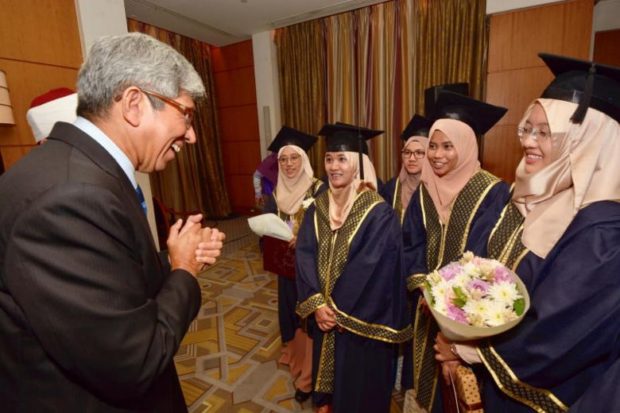
Minister-in-charge of Muslim Affairs Dr Yaacob Ibrahim speaking with graduates from the Al Azhar University in Egypt, at the Four Seasons Hotel in Cairo, on Nov 5, 2017. PHOTO: MUIS
The research and education arm of the Islamic Religious Council of Singapore (Muis) has launched a new course that aims to help Islamic teachers read religious texts in the context of Singapore’s multi-religious society.
The new course, titled Islam in Context, will be offered by the Muis Academy from this month.
It is an abridged version of an existing course – Islamic Thought in Contemporary Plural Societies – currently offered by the S. Rajaratnam School of International Studies (RSIS).
Minister-in-charge of Muslim Affairs Dr Yaacob Ibrahim announced this step in Cairo on Sunday (Nov 5) at a graduation ceremony for Singaporean students at Egypt’s Al Azhar University – a renowned institute for Islamic studies.
The new course will offer modules that deal with issues such as nurturing inclusiveness, and the need to contextualise Islamic traditions and how to apply them in Singapore’s plural society.
Dr Yaacob said in his speech, which was released on Monday (Nov 6): “We want our graduates to be kept abreast of current and emerging socio-religious trends and to equip them with tools to contextualize the knowledge acquired.”
He urged the graduates to attend the programmes, as part of their “continuous development” as religious teachers.
The four-week course will be a pre-requisite for religious teachers to obtain accreditation under the compulsory Asatizah Recognition Scheme (ARS).
At the ceremony, Dr Yaacob presented certificates to 26 graduates.
In his speech, he also spoke of the challenges facing religious leaders and their role in the community and nation today.
He noted that Singapore today is “faced with the triple threat – of extremist ideology, segregationist beliefs and practices, and Islamophobia”, and strong religious leaders are needed.
These are asatizah “who possess an expansive worldview, who are able to hold their own against the varied demands of today, while holding strong to their Islamic tenets and beliefs”, he said.
He pointed out that the community no longer relies only on teachers in classrooms for knowledge and guidance, and social media is fast replacing traditional platforms for learning. “It is therefore critical that asatizah continuously upgrade themselves and be equipped with the skills to teach and share knowledge using digital and social media,” he said.
Finally, religious teachers cannot allow preachers with extremist ideologies to “hijack and tarnish the good name of Islam as the religion of peace”.
“Instead, we must be confident as a Muslim and uphold the values and attributes of our Singapore Muslim identity, and the principles of multiracialism and meritocracy which are essential to our nation,” he said.